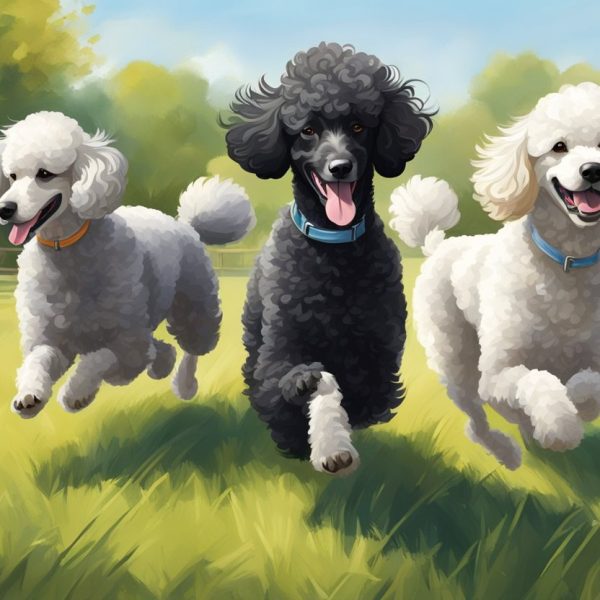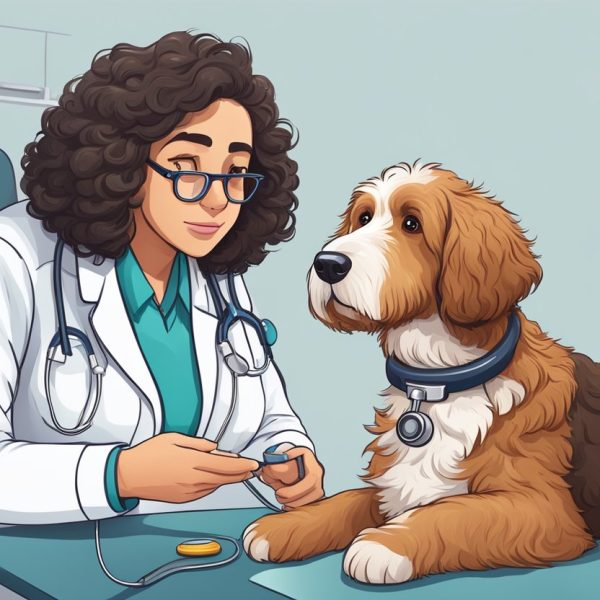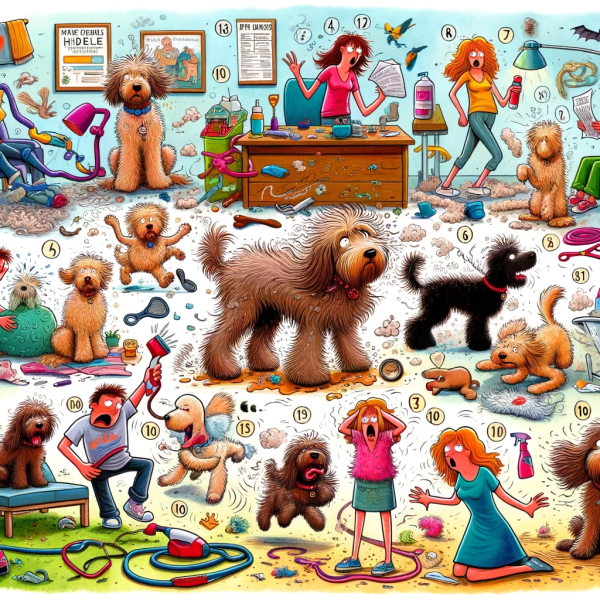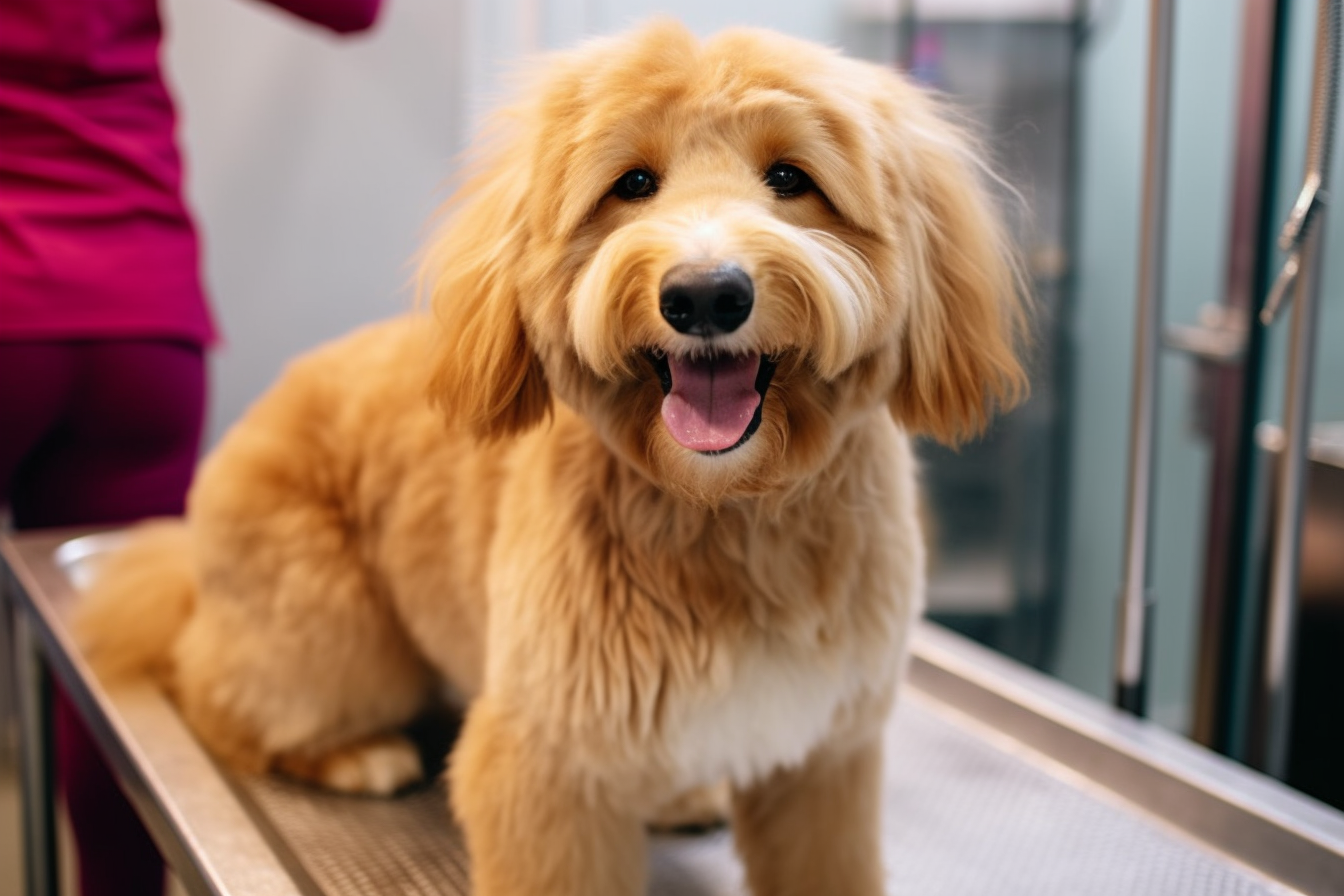Introduction
Welcome, fellow Poodle enthusiast! Isn’t it just the best feeling in the world to have a Poodle as your fur friend? Their charming looks, keen intelligence, and adorable antics delight every moment with them. But, let’s be honest, parenting a Poodle, or any pet for that matter, isn’t all cuddles and playtime. It’s a big responsibility filled with countless questions and decisions. That’s why we’re here. We’re diving head-first into the wonderful world of Poodle parenting.
This guide covers everything you need to know about raising a Poodle. From understanding your Poodle’s unique needs to learning the best ways to train them, from setting up a safe and fun home environment to ensuring their health and happiness. We’re leaving no stone unturned!
Get ready to embark on this exciting journey of Poodle parenting. You will learn a ton, and we guarantee you’ll have a lot of fun along the way. So grab a cup of coffee, settle in with your Poodle by your side, and let’s get started!
Understanding Your Poodle
Every Poodle is unique, and that’s what we love about them! But understanding them starts with knowing more about their history, temperament, physical characteristics, and different varieties. Let’s take a deep dive into the world of Poodles!
A. Poodle’s History and Background
Imagine a time centuries ago, a time when Poodles had jobs! Surprised? Don’t be! Our fluffy friends were originally bred as water retrievers in Germany. They were even named “Pudel,” which means “to splash” in German. Pretty cool, right? It’s their intelligence and their love for water that made them excellent working dogs. While their working days are mostly behind them, they’ve splashed their way right into our hearts and homes!
B. Poodle’s Temperament and Behavior
If you’re a Poodle parent, you already know this—Poodles are smart, and we mean really smart! They’re ranked as the second most intelligent dog breed. But that’s not all. They’re also known for their lively personalities and a fantastic sense of humor. Yes, your Poodle can make you laugh, and often will! But remember, their intelligence means they need mental stimulation, so keep those puzzles and games handy.
C. Physical Characteristics
Ahh, the signature Poodle look! That curly, hypoallergenic coat feels like touching a fluffy cloud. Their compact body is built for agility, and their dark, expressive eyes speak volumes. They have a square build, and their height at the shoulders is roughly the same as their length. But don’t forget looks can be deceiving! Underneath all that fluff is a strong and athletic dog.
D. Varieties of Poodles
There’s more than one way to love a Poodle, and that’s because there’s more than one type of Poodle. We have the Standard Poodles, the biggest of the lot. Then there are the Miniature Poodles, smaller but just as charming. And finally, the Toy Poodles, the smallest but with personalities that are anything but small. Each one has its unique charm, but all of them share the distinct Poodle traits we know and love.
Now that you’ve gotten to know your Poodle a bit better, let’s move on to setting up a home that’ll delightfully make it wag its tail!
Setting Up Your Home for a Poodle
Ready to roll out the red carpet for your Poodle at home? Let’s create a Poodle-friendly space that’s not just safe, but also super fun for your fur baby!
A. Creating a Poodle-Friendly Environment
Poodles are curious, lively, and they love to explore! Give them a space that encourages their curiosity while keeping them safe. Ensure you have plenty of chew-safe toys for them to gnaw on, interactive toys to engage their sharp minds, and of course, a comfy bed to plop on after a day of fun and games. And don’t forget about a dedicated ‘potty area’, especially for the puppies in the house!
B. Essential Equipment and Supplies
Shopping for a Poodle? It’s like shopping for a kid—endlessly exciting but a little bit daunting! You’ll need the basics: food and water bowls, a collar and leash, a crate, and grooming supplies. Then there are the toys (the more, the merrier!), a comfy bed, and perhaps a cute sweater for those chilly winter walks. A tip? Invest in quality supplies—it’s worth it in the long run!
C. Safety Measures and Considerations
Safety first, always! Poodles are nimble and adventurous, which can sometimes lead them into trouble. Secure your home by removing toxic plants, securing loose wires, and blocking off dangerous areas like the staircase for puppies. Keep small objects that can be swallowed out of reach, and ensure your Poodle can’t dash out of an open door. It’s all about creating a safe haven where your Poodle can happily prance around!
Setting up a Poodle-friendly home is the first step in welcoming your Poodle into your family. Once that’s done, you’re ready to dive into the next exciting phase—ensuring they’re as healthy as can be! Let’s get to it.
Nutrition and Health Care
Poodles are royalty, and we want them to live long, healthy lives, right? That starts with the right nutrition and health care. It’s time to don your apron and stethoscope, dear Poodle parent!
A. Understanding Poodle Nutrition
Just like us, Poodles need a balanced diet to thrive. They need proteins for those strong muscles, carbs for energy, fats for a shiny coat, and of course, vitamins and minerals for overall health. Whether you opt for commercial dog food or home-cooked meals, make sure it’s nutritionally balanced. And remember, treats are great, but they should only make up 10% of your Poodle’s diet. Keep it healthy, keep it tasty, and your Poodle will be wagging their tail at mealtime!
B. Regular Health Check-ups and Vaccinations
Ever heard the saying, “Prevention is better than cure”? It’s doubly true for our furry friends. Regular vet check-ups can help spot potential health issues early. Also, keep your Poodle’s vaccinations up to date. It’s a simple step, but it goes a long way in keeping them healthy. So, make your vet your new best friend, and your Poodle will thank you!
C. Common Health Issues in Poodles
Poodles are generally healthy, but they do have a few breed-specific health issues. Hip dysplasia, eye disorders, and certain skin conditions are a few to watch out for. But don’t worry, with regular vet visits and a keen eye for any changes in your Poodle’s behavior or appearance, you can tackle these issues head-on.
D. Importance of Pet Insurance
Accidents happen. Illnesses occur. And when they do, you want to be prepared. That’s where pet insurance comes in. It can help cover the cost of veterinary care, which can sometimes be quite hefty. Consider it a safety net for your Poodle’s health.
Now that we’ve covered health and nutrition, it’s time to move on to the fun part—training your Poodle! Ready to become the best Poodle trainer in town? Let’s go!
Training Your Poodle
Poodles are smarty-pants, and training them can be a joy! But remember, patience and consistency are key. Ready to start? Let’s get into training mode!
A. Basic Training and Socialization
Sit, stay, come, down! Sounds familiar? These are the basic commands every Poodle should know. Start with these, and you’ll have a well-behaved Poodle in no time. But training isn’t just about commands. It’s about socialization too. Introduce your Poodle to different people, places, sounds, and situations. The world is a big, exciting place, and your Poodle is eager to explore it with you!
B. Addressing Behavioral Issues
Got a Poodle that’s a bit too enthusiastic about digging up your garden? Or perhaps one that barks a tad too much? Don’t worry, you’re not alone. Poodles can have behavioral issues, but the good news is they’re usually easy to manage with consistent training. So don’t lose heart! Your Poodle can learn to behave, and you can save your garden (and your sanity!).
C. Advanced Training and Activities
Poodles are quick learners, and once they’ve mastered the basics, they’re ready for the next level. Try agility training, obedience trials, or even dog dancing (yes, it’s a thing!). These activities not only challenge your Poodle but also strengthen your bond with them. Plus, they’re a whole lot of fun!
D. Importance of Consistent Training
Consistency is the secret sauce of successful training. Make sure everyone in the family uses the same commands and follows the same rules. A consistent approach will help your Poodle understand what you expect from them. And before you know it, you’ll have a well-trained Poodle that’s a joy to be around!
Now that we’ve got training down pat, let’s move on to the next exciting part—grooming your Poodle. Ready to get your Poodle looking their best? Let’s do it!
Grooming Your Poodle
Poodles are the supermodels of the dog world, and their grooming routine is a big part of their charm! It’s time to roll up your sleeves and dive into the world of Poodle grooming.
A. Importance of Regular Grooming
Regular grooming isn’t just about keeping your Poodle pretty—it’s about keeping them healthy too. Brushing keeps their coat free from mats, clipping their nails ensures comfortable walking, and cleaning their ears can prevent infections. So grab that brush and get grooming!
B. DIY Grooming vs Professional Services
Should you groom your Poodle yourself, or should you hire a professional groomer? It’s a big question! DIY grooming can be a great bonding experience, but it does require time and patience. On the other hand, professional groomers have the right tools and skills to get your Poodle looking their best. The choice is yours, Poodle parent!
C. Grooming Products and Tools
Ready to turn your home into a mini Poodle salon? You’ll need a few essential tools: a good brush for detangling, dog-safe shampoo for bath time, a pair of nail clippers, and maybe even a hairdryer for that fluffy finish. And remember, always choose products that are safe and suitable for Poodles.
D. Handling Grooming-Related Stress
Let’s face it, not all Poodles are fans of grooming. Some may get stressed or anxious. But don’t worry, you can help them relax. Make grooming a positive experience with plenty of praise and treats. Keep your grooming sessions short and always end on a positive note. Before you know it, your Poodle might just start looking forward to grooming time!
With your Poodle groomed to perfection, we’re now ready to wrap things up. Ready to recap and reflect? Let’s dive into the conclusion.
Conclusion
Wow, what a journey it’s been! From understanding your Poodle to setting up a Poodle-friendly home, from ensuring their health and nutrition to training and grooming them, we’ve covered it all. Being a Poodle parent is an adventure filled with countless joys, a few challenges, and endless love.
Remember, Poodle parenting isn’t a one-size-fits-all. Every Poodle is unique, and what works for one might not work for another. Be patient, be consistent, and most importantly, enjoy every moment. After all, you’re not just a Poodle parent—you’re a member of the fascinating and fun-loving Poodle community!
And hey, even on days when the training seems tough or the grooming seems endless, look into those loving, playful eyes of your Poodle. You’ll know, without a doubt, that every bit of effort is totally worth it. Because at the end of the day, the love of a Poodle is a truly special thing.
So here’s to you, dear Poodle parent. To the lessons you’ll learn, to the love you’ll share, and to the wonderful journey of Poodle parenting that lies ahead. It’s going to be a fantastic ride!
Stay pawsome!
Frequently Asked Questions
Q1: How long do Poodles live?
A: On average, Poodles have a lifespan of 10-18 years. Standard Poodles tend to live 10-12 years, while Miniature and Toy Poodles can live up to 15-18 years. Of course, this can vary based on factors like genetics, diet, exercise, and overall health care.
Q2: Are Poodles good with children and other pets?
A: Absolutely! Poodles are known for their friendly and gentle nature. They generally get along well with children and other pets. However, it’s always important to supervise interactions between pets and young children to ensure the safety of both.
Q3: How much exercise does a Poodle need?
A: Poodles are energetic and require regular exercise to keep them happy and healthy. A good rule of thumb is at least one hour of exercise per day. This could include walks, playtime, or even dog sports like agility training.
Q4: What is the best diet for a Poodle?
A: Poodles need a balanced diet that includes high-quality proteins, carbohydrates, fats, and essential vitamins and minerals. You can opt for high-quality commercial dog food or prepare home-cooked meals. Always consult with your vet to determine the best diet for your Poodle.
Q5: Can Poodles be left alone at home?
A: Poodles are social animals and love being around their human family. While they can tolerate being alone for short periods, they shouldn’t be left alone for long durations. Prolonged isolation can lead to separation anxiety and destructive behaviors.
Q6: How often should I groom my Poodle?
A: Poodles require regular grooming due to their dense, curly coats. You should brush your Poodle at least every other day to prevent matting and tangling. Professional grooming, including haircuts, should typically be done every 4-6 weeks.
Q7: Are Poodles easy to train?
A: Yes, Poodles are highly intelligent and typically very responsive to training. They’re quick learners and can master a variety of commands and tricks. However, training should always be consistent and positive.
Q8: Do Poodles have any common health issues?
A: Like all breeds, Poodles can be prone to certain health conditions. These can include hip dysplasia, certain eye disorders, and skin conditions. Regular vet check-ups and a healthy lifestyle can help manage these potential health issues.
Q9: Do Poodles need a lot of attention?
A: Poodles are intelligent and social dogs that thrive on interaction and mental stimulation. They enjoy being part of family activities and require regular exercise and interaction. So yes, they do need a fair bit of attention!
Q10: Why is my Poodle barking so much?
A: Poodles might bark for various reasons—boredom, alerting you to something, seeking attention, or even anxiety. Understanding the cause can help you address the issue. If excessive barking becomes a problem, it’s worth consulting with a professional dog trainer or behaviorist.
And there you have it, fellow Poodle parents! We hope you’ve found this guide helpful on your journey into the fantastic world of Poodle parenting. But remember, this is just the beginning! There’s so much more to explore and learn about these fabulous furry friends of ours.
Curious to know more? Excited to dive deeper? Then stay tuned to our blog! We’ve got tons more Poodle-related content lined up just for you. From expert advice on Poodle care, to fun-filled Poodle activities, to heartwarming Poodle stories—we’ve got it all!
Don’t miss out on your chance to become the ultimate Poodle parent. Keep reading, keep learning, and most importantly, keep loving your Poodle. Here’s to a lifetime of Poodle happiness!
Keep reading our blog for more Poodle awesomeness!







